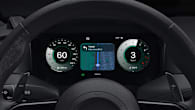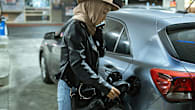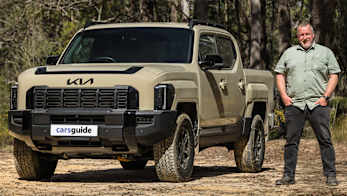Which road users are allowed in the bus lane?
Bus lanes are a means of keeping buses moving for more of the time, rather than having them contend with whatever other traffic is clogging up the road.
But this special lane for buses carries some interesting rules for other road users, including when – or if – other traffic is allowed to occupy the bus lane.
And there are penalties for getting it wrong, so it pays to know what’s okay and what’s not. Specifically, when are cars allowed in bus lanes?
The best way to wrap this up is to go around the country, state by state and territory, to see where the laws differ. So here goes…
.jpg)
Victoria
The law down south states that drivers of cars and trucks are not allowed to drive in the bus lane, unless they’re within 100 metres of making a turn from that bus lane.
In narrower settings, the bus lane can also be used by other traffic if they’re doing so to overtake a car that has stopped in the centre lane to turn right or make a U-turn (the latter is legal at many intersections in Victoria).
Other exceptions are if the road signs show that other vehicles can use the bus lane. On some Victorian bus lanes, signage allows motorcycles to use these lanes at particular times of the day.
The bus lane can also be used if drivers need to avoid a traffic obstruction, or they’re riding a bicycle (unless there’s a sign forbidding bicycles).
Generally, what you can’t do is stop in a bus lane, unless you’re actually driving a bus and stopping to pick up or set down passengers. But, at other times, the bus lane may revert to a parking lane, so check the signage carefully.
.jpg)
NSW
Apart from buses, bus lanes in NSW can also be used by taxis (but not rideshare cars) hire cars with HC number-plates, emergency vehicles, motorcycles and bicycles.
The state rules say you cannot stop in a bus lane, and the only vehicles allowed to do so are buses at designated bus stops, hire cars and chauffeur-driven hire cars picking up and dropping off passengers.
Other vehicles can use a bus lane if there’s a sign saying so or if they’re avoiding an obstruction but can also use the bus lane for up to 100m if they’re entering or leaving the road, to overtake a vehicle turning right, or entering a lane from the side of the road.
Like many states, NSW polices the latter 100m rule via fixed cameras.
WA
The rules for bus lanes in WA are broadly similar to NSW with taxis allowed in some bus lanes in some, but not all, instances.
The other stipulation in WA is that, if you intend to use the bus lane to enter or leave the road or pass an obstruction, you must give way to any vehicle that is already using – or even crossing - the bus lane.
SA
South Australia has what are called priority bus lanes which work in a similar way to other parts of the country. As well as buses, bicycles, emergency vehicles and taxis can use these lanes. So can a car or truck for up to 100m as they enter or leave the road, avoid an obstruction or make a U-turn.
.jpg)
Queensland
Any bus, taxi, limousine or emergency vehicle can use a bus lane in QLD, and buses, taxis and limos can stop in a bus lane to pick up or drop off passengers.
Motorcycles and personal mobility devices are not allowed to use bus lanes, but can – as can cars and trucks – for a maximum of 100m to make a turn, enter a lane or service road or avoid an obstacle.
Tasmania
The Apple Isle has the same rules as the rest of the country including cars and trucks being allowed in bus lanes if they’re turning or avoiding an obstacle.
ACT
Known for its roundabouts and bike paths, the ACT has the same bus lane rules as the rest of the country. So, you can drive in a bus lane for up to 100m to enter or leave the road or avoid an obstruction.
Other than that, only buses, taxis, hire cars and emergency service vehicles can use or stop in an active bus lane.
.jpg)
NT
The relaxed pace of life in the Northern Territory is reflected in the fact that, even though there are provisions for bus lane laws, there are actually no bus lanes. Enough said.
Things to remember
The broad definitions used here preclude rideshare cars from being classed as taxis or hire cars. That is, rideshare cars are treated the same as private cars as far as bus lane usage is concerned.
Not all bus lanes are active all of the time. In some cases, lanes only operate as bus lanes in peak travel times. Beyond that, they’re normal road lanes. A sign should tell you what those times are and if they apply at all.
And to answer some specific questions, these are the short answers to the majority of questions on the subject (again, make sure you check your state or territory’s fine-print):
How far can you drive in a bus lane? For private vehicles, the maximum distance in a bus lane is 100 metres, but only if you fulfil the requirements of each state and territory for doing so.
Which road users are allowed in the bus lane? Buses – obviously – hire cars and limousines, taxis and emergency vehicles. Some states have different rules for bicycles and motorcycles, so check each state entry.
.jpg)
How long can you drive in a bus lane? There’s no time limit; the limit is on distance.
Can you park in a bus lane? No. If the lane is active, then the only vehicles that can stop in it are buses, taxis, hire cars and emergency vehicles.
Are bicycles allowed in bus lanes? Yes, provided it’s a bus lane and not a bus-only lane.
Can motorcycles use bus lanes? Not in every case. Some bus lanes allow motorcycles to use them, but they’ll be sign-posted as such.
Can you use the bus lane to overtake the vehicle signalling to turn right? Yes. This is one of the ways bus lanes help keep traffic flowing. However, you must give way to any vehicle already in the bus lane before switching into to it to make the overtaking move.
When can a private car travel in a bus lane? Only in the last 100 metres until it turns from the bus lane into another street, service road or laneway. Or if it’s avoiding a traffic obstruction or overtaking a car that’s turning right. Or if the bus lane is not, at that point in time, active.
.jpg)
What is the maximum distance you can drive in the bus lane to overtake the vehicle in front of you? The same 100 metre limit applies here.
Is there a fine for bus lane infringements? You bet there is. And it is usually at least a couple of hundred dollars and carries license demerit points, too.
Is the bus lane camera a real thing? Yep. Many bus lanes use these to stamp out incorrect use.
How far can you drive in a bicycle lane? The rules for bike lanes generally mimic those for bus lanes. That is, a car can travel in a bicycle lane in order to turn left or right or to overtake a car in front turning right.
The major difference is that this is only allowed for a distance of 50 metres, not the 100 metres of a bus lane. And before we get too deep here, understand that bicycle lane rules are a whole other legal subject.






.jpg)
.jpg)

.jpg)


.jpg)


_0.jpg)
.jpg)

.jpg)




.jpg)

